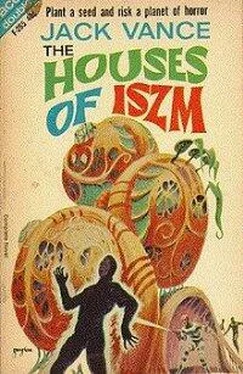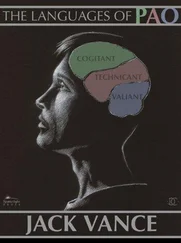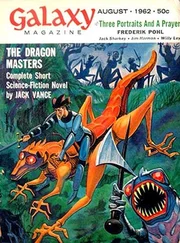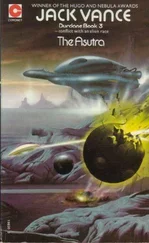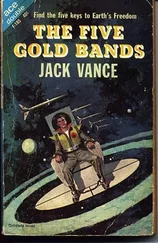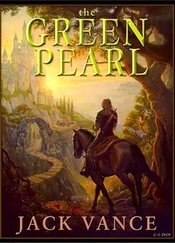Zhde Patasz’s eyes snapped. “But this is crudity! You understand, do you not? A dwelling must be all of a unit—the walls, the drainage, the decor grown in! What use is our vast lore, our two hundred thousand years of effort, otherwise? Any ignoramus can paste up green floss, only an Iszic can grow it!”
“Yes,” said Farr. “I believe you.”
Zhde Patasz continued, passionately waving his viewer. “And if you stole a female house, and if you managed to breed a five-pod house, that is only the beginning. It must be entered, mastered, trained. The webbings must be cut; the nerves of ejaculation must be located and paralyzed. The sphincters must open and close at a touch.
“The art of house-breaking is almost as important as house-breeding. Without correct breaking a house is an unmanageable nuisance—a menace.”
“K. Penche breaks none of the houses you send to Earth.”
“Pahl Penche’s houses are docile, spiritless. They are without interest. They lack beauty, grace.” He paused. “I cannot speak. Your language has no words to tell what an Iszic feels for his house. He grows it, grows into it. His ashes are given it when he dies. He drinks its ichor; it breathes his breath. It protects him; it takes on the color of his thoughts. A spirited house will repel a stranger. An injured house will kill. And a Mad House—that is where we take our criminals.”
Farr listened in fascination. “That’s all very well—for an Iszic. An Earther isn’t so particular—at least, a low income Earther. Or as you would put it, a low-caste Earther. He just wants a house to live in.”
“You may obtain houses,” said Zhde Patasz. “We are glad to provide them. But you must use the accredited distributors.”
“K. Penche?”
“Yes. He is our representative.”
“I think I will go to bed,” said Farr. “I am tired and my head hurts.”
“A pity. But rest well, and tomorrow, should you choose, we will inspect my plantation. In the meantime, my house is yours.”
The young woman in the black turban conducted Farr to his chambers. She ceremoniously bathed his face, his hands, his feet, and sprayed the air with an aromatic scent.
Farr fell into a fitful slumber. He dreamt of the Thord. He saw the blunt brown face, heard the heavy voice. The abrasion on his scalp stung like fire, and Farr twisted and turned.
The brown man’s face disappeared like an extinguished light. Farr slept in peace.
The following day Farr awoke to the sighing whispering sounds of Iszic music. Fresh clothing hung close at hand, which he donned and then went out on the balcony. The scene was one of magnificent eerie beauty. The sun, Xi Aurigae, had not yet risen. The sky was an electric blue and the sea a plum-colored mirror, darkening to a tarnished black at the horizon. To right and left stood the vast and intricate houses of the Tjiere aristocrats, the foliage in silhouette against the sky, and the pods showing traces of muted colors: dark blue, maroon, deep green, like old velvet. Along the canal dozens of gondolas drifted. Beyond spread the Tjiere bazaar where goods and implements from the industrial systems of South Continent and a few off-world items were distributed by some apparently casual means of exchange not completely clear to Farr.
From within the apartment came the sound of a plucked string. Farr turned to find two attendants carrying in a tall compartmented buffet laden with food. Farr ate wafers, fruits, marine tubers and pastes while Xi Aurigae bulged gradually over the horizon.
When he finished, the attendants reappeared with a promptness that caused Farr a twinge of wry amusement. They removed the buffet, and the Iszic woman who had greeted Farr the previous evening now entered. Today her normal costume of black ribbons was augmented by a complicated headdress of the same black ribbons which concealed the knobs and ridges of her scalp and gave her an unexpectedly attractive semblance. After performing an elaborate ceremonial salute she announced that Zhde Patasz awaited Farr Sainh’s pleasure.
Farr accompanied her to the lobby at the base of the great trunk. Here Zhde Patasz waited in the company of an Iszic whom he introduced as Omon Bozhd, a general agent for the house-growers’ cooperative. Omon Bozhd was taller than Zhde Patasz, his face was rather broader and less keen, and his manner was almost imperceptibly brisker and more direct. He wore bands of blue and black, with black cheek disks, a costume Farr vaguely understood to indicate one of the upper castes. Zhde Patasz’s manner toward Omon Bozhd seemed a peculiar mixture of condescension and respect, insofar as Farr could define it. Farr ascribed Zhde Patasz’s attitude to the discord between Omon Bozhd’s caste and his pallid white skin which was that of a man from one of the southern archipelagoes, or even South Continent, and which lacked the pale blue tinge distinguishing the aristocratic planters of the Pheadh. Farr, sufficiently perplexed by the extraordinary attention he was receiving, gave him no great attention.
Zhde Patasz conducted his guests to a charabanc with padded benches, supported by a hundred near-silent whorls of air. There was no attempt at embellishment or decoration, but the pale shell of the structure, grown in one piece along with the curved and buttressed railings, the arched seats and the dangling fringe of dark brown fiber, were sufficiently striking in themselves. A servant in red and brown bands straddled a prong protruding forward and worked the controls. On a low bench to the rear sat two other servants who carried the various instruments, emblems and accoutrements of Zhde Patasz, serving purposes which Farr for the most part could not guess.
At the last minute a fourth Iszic joined the group, a man in blue and gray bands whom Zhde Patasz introduced as Uder Che, his “chief architect.”
“The actual Iszic word,” said Zhde Patasz, “of course is different, and includes an array of other meanings or resonants: biochemist, instructor, poet, precursor, one who lovingly nurtures, much else. The end effect, nonetheless, is the same, and describes one who creates new sorts of houses.”
Behind, as a matter of course, came a trio of the ubiquitous Szecr riding another smaller platform. Farr thought he recognized one of the group as his escort at the time of the Thord raid, the author of the various indignities to which he had been subjected. But he could not be certain. To his alien eye all Iszic looked alike. He toyed with the idea of denouncing the man to Zhde Patasz, who had sworn to have him drowned. Farr restrained the urge; Zhde Patasz might feel impelled to make good his word.
The platform glided off under the massive tree-dwellings at the center of town, out along a road which led beside a series of small fields. Here grew the gray-green shoots Farr recognized as infant houses. “Class AAA and AABR houses for the work-supervisors of South Continent,” explained Zhde Patasz with a rather patronizing air. “Yonder are four- and five-pod trees for the artisans. Each district has its unique requirements, the description of which I will not burden you. Our off-world exports of course are not of such critical concern, since we only sell a few standard and easily grown structures.”
Farr frowned. It seemed that Zhde Patasz’s patronizing manner had become more pronounced. “You could increase your off-world sales tremendously if you chose to diversify.”
Zhde Patasz and Omon Bozhd both exhibited signs of amusement. “We sell as many trees off-world as we choose. Why strive further? Who appreciates the unique and exceptional qualities of our houses? You yourself tell us that the Earther regards his house as hardly more than a cubicle to ward off the weather.”
“You misunderstood me—or perhaps I expressed myself poorly. But even if this were wholly true—which it isn’t—the need still exists for a whole variety of houses, on Earth, as well as on the other planets to which you sell houses.”
Читать дальше
